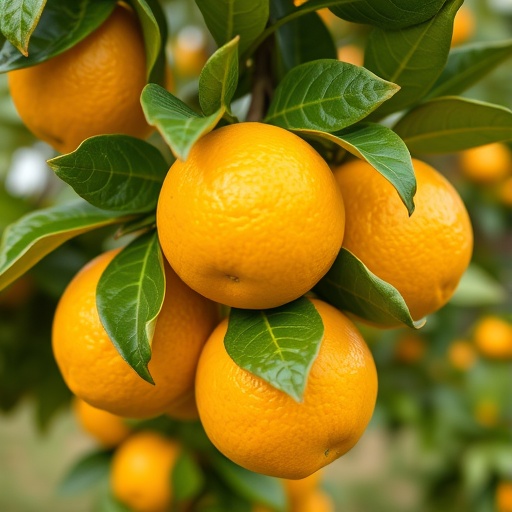In the world of agricultural genomics, a groundbreaking study has emerged, revealing vital insights into fruit quality traits in citrus through innovative genomic approaches. This research, spearheaded by a distinguished team of scientists, aims to uncover the underlying genetic components that govern the characteristics of citrus fruits, particularly focusing on quality traits essential for consumer satisfaction and marketability. The study employs a cutting-edge methodology known as genome-wide association studies (GWAS), utilizing Genotyping-by-Sequencing (GBS) as its primary tool for genetic exploration.
This research is particularly timely as the demand for high-quality citrus fruits continues to rise globally. Citrus fruits, including oranges, lemons, and limes, are not only a fundamental source of essential nutrients but also play a crucial role in the economic stability of many countries that rely heavily on citrus production. However, challenges such as climate change, pests, and diseases threaten the yield and quality of these fruits. Consequently, the identification of candidate genes responsible for important fruit quality traits becomes paramount in cultivating improved varieties that can withstand these pressures.
Using GBS, the research team efficiently captures genetic variations across a wide range of citrus accessions. This high-throughput sequencing technique allows for the rapid identification of single nucleotide polymorphisms (SNPs) that are pivotal for understanding the genetic architecture of fruit quality traits. By analyzing these SNPs in conjunction with observed phenotypic traits, the researchers established robust associations that link specific genetic markers to desirable qualities, such as sweetness, acidity, juiciness, and shelf life.
The approach taken in this study marks a significant advancement over traditional breeding methods, which often lack the precision and speed required to meet evolving consumer preferences. By leveraging genomic data, scientists are not only able to enhance the quality of citrus fruits but also to potentially accelerate the breeding process. This reduction in the time from lab to market can ensure that consumers enjoy fresh, high-quality citrus fruits year-round.
Among the critical findings of this research is the identification of several candidate genes that are strongly associated with fruit quality traits. The annotated genes offer potential targets for future genetic enhancement through selective breeding or biotechnological interventions. Each identified gene contributes uniquely to the overall quality profile of citrus fruits, engaging pathways that are involved in sugar accumulation, flavor development, and fruit maturation.
Furthermore, this study emphasizes the importance of an integrated approach that combines genomic data with phenotypic assessments. By thoroughly examining the traits that consumers value the most, such as taste and texture, researchers can tailor their breeding strategies to produce varieties that not only meet but exceed market expectations. This is crucial as consumers are increasingly becoming more aware of the quality and origins of their food, prompting a shift in demand toward products that are both superior in taste and grown sustainably.
Additionally, the collaboration among researchers from various fields—genomics, horticulture, and consumer sciences—fosters a holistic perspective on citrus improvement. This multidisciplinary collaboration enables a more comprehensive understanding of how various factors, including environmental influences and cultivation practices, interact with genetic makeup to affect fruit quality. Such insights can pave the way for developing management practices that synergize agricultural techniques with genetic advancements.
The implications of this research extend beyond the immediate impact on the citrus industry. The methodology and findings could set a precedent for other fruit and vegetable crops, illustrating how genomic tools can be employed to achieve significant improvements in agricultural produce. As resolved by this study, the applications of GBS and GWAS could be harnessed in diverse contexts, addressing global food security challenges while maintaining economic viability for farmers.
In the era of precision agriculture, farmers will benefit immensely from genomic insights that allow for informed decision-making regarding cultivar selection and crop management. Enhanced genetic understanding leads to the ability to predict which traits will confer resilience against biotic and abiotic stresses, thereby safeguarding production against the uncertainty linked to climate variability and disease outbreaks.
As we look toward the future of citrus breeding, the findings presented in this study serve as a beacon of hope and innovation. The marriage of technology and traditional agriculture can redefine the landscape of food production. The research emphasizes that with the proper application of advanced genetic tools, the agricultural sector can not only survive but thrive amidst the myriad challenges it faces today.
In conclusion, the investigation into candidate genes for fruit quality traits epitomizes the potential of modern genomics to transform the citrus industry. By identifying and characterizing the genetic underpinnings of fruit quality traits through GBS-based GWAS, the research team paves the way for the development of superior citrus varieties that cater to consumer demands. The collaboration and advancements in this field emphasize the importance of continuous innovation toward achieving sustainability and resilience in agriculture, ensuring a better future for both producers and consumers alike.
Subject of Research: Candidate Genes for Fruit Quality Traits in Citrus
Article Title: Emanating candidate genes responsible for fruit quality traits in citrus through GBS-based genome wide association studies.
Article References:
Bala, H., Kaur, M., Manchanda, P. et al. Emanating candidate genes responsible for fruit quality traits in citrus through GBS-based genome wide association studies.
BMC Genomics (2025). https://doi.org/10.1186/s12864-025-12337-8
Image Credits: AI Generated
DOI:
Keywords: Citrus genetics, fruit quality traits, Genome-Wide Association Studies (GWAS), Genotyping-by-Sequencing (GBS), agricultural genomics, economic viability, precision agriculture.




